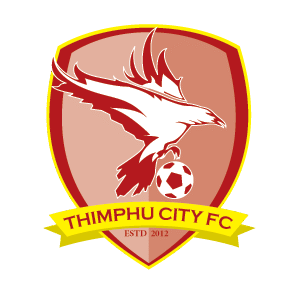Origins and Foundation
Thimphu City FC traces its roots back to the legendary Drukstar FC, one of Bhutan’s earliest and most successful football clubs. In the early 2010s, a turning point emerged within the club’s leadership. Following internal differences among the management, the then-president of Drukstar, Hishey Tshering—a passionate bird-watcher and visionary football enthusiast—departed to form a new club. This new entity, Zimdra FC, became home to many key Drukstar players, including the national stalwarts Passang Tshering, Karun Gurung, and a young Karma Shedrup Tshering.
Zimdra FC competed for two seasons and later rebranded as Thimphu City FC in 2012, coinciding with the Bhutan Football Federation’s revamp of the domestic football structure from the A-Division to the National League. The rebranding signaled a new era—marked by professionalism, growth, and consistent performance.
Rise in Bhutanese Football
Since its inception as Thimphu City FC, the club has been a mainstay in Bhutan’s top-tier football. From 2012 onwards, City has appeared in every edition of the National League and its successor, the Bhutan Premier League—becoming the only team to do so. Notably, the club has never finished outside the top three in any domestic competition it has participated in.
City’s closest domestic rival has historically been Transport United, the club it has faced more than any other in competitive fixtures.
The Breakthrough Year: 2016
The year 2016 is considered a milestone in Thimphu City’s journey. The club claimed its first major silverware by winning the Thimphu League with an all-Bhutanese squad. This victory also secured their place in the 2016 National League. For the national campaign, the club made its first foreign signing—Vincent Deacon, a teacher from England based in Thimphu.
That same season, Thimphu City went on to win the National League title, guided by captain Tshering Dorji—affectionately known as “Tshagay”—who had previously scored Bhutan’s historic goal in their 2015 World Cup Qualifier victory against Sri Lanka. The club’s triumph in 2016 was a defining moment and marked the beginning of a new golden chapter.
Managerial Evolution
Initially managed by player-coach Passang Tshering, the club saw steady progress in its early years. In 2016, Passang became a full-time manager. After the club’s participation in the AFC Cup playoff in early 2017, the coaching mantle was handed to Karun Gurung, who had just returned after winning back-to-back national titles with Druk United and FC Tertons.
Karun led the team to an invincible Thimphu League campaign in 2017 before leaving for Australia, where he would later establish Football Bhutan Western Australia (FBWA). Vincent Deacon then took over managerial duties for the 2017 National League.
In 2018, Passang returned briefly before handing the reins to Coach Pema Dorji, who had also previously managed Druk United and FC Tertons to national success. In 2019, the club hired British coach Joshua Shepherd for a season.
Women’s Team and Legacy
Thimphu City FC made history in 2016 by launching its women’s team, which immediately set a high standard by winning the inaugural Thimphu Women’s League. Dominating the competition with just one loss (to FC Tertons), they became the first champions in Bhutanese women’s football. As the saying goes—while many may follow, there will only ever be one first champion.
This victory was symbolic of City’s commitment to gender inclusivity and youth development. The women’s team later partnered with Sunrise Women FC for two seasons under a sponsorship agreement, before going on a brief hiatus. In 2025, they made a strong comeback, signing top talents from Bangladesh and re-entering the domestic scene with renewed ambition.
Academy and Youth Development
In late 2016, the club began laying the foundation for a structured academy. By January 2017, Thimphu City Academy officially launched its programs for various age groups. The academy quickly rose to prominence when the U18 boys’ team won their first title in the national U18 Championship. A highlight of the season was their redemption win over Ugyen Academy, ending the latter’s dominance.
City’s youth system emphasizes holistic development—balancing academic commitments with professional training. Many of the current first-team players are products of this system, showcasing the club’s commitment to sustainable football excellence.
International Participation
Thimphu City’s domestic success earned them their first international appearance in January 2017, when they represented Bhutan in the AFC Cup playoff. Facing Club Valencia of the Maldives, City drew at home but lost the away fixture. Despite the early exit, the participation itself marked a new high in the club’s ambitions and experience.
Sponsorships and Partnerships
The 2016 season also brought unprecedented commercial success. City became the first Bhutanese club to sign a kit manufacturing deal—partnering with Spicers from Thailand. That same year, a beverage brand, DewFresh, came onboard as a sponsor.
Over the years, Thimphu City signed notable kit deals with Nivia (India), Hummel (Denmark), and currently OneAllSport. However, the most enduring relationship has been with Jebba, a Bhutanese brand that has supported the club as the main sponsor for over a decade.
Social Commitments and Community Impact
Thimphu City has consistently leveraged football as a tool for positive change. In 2017, the club partnered with UNICEF Bhutan for the campaign “Empowering Girls Through Sports | To Become Agents of Change,” promoting gender equality and empowerment.
Beyond advocacy, the club has contributed to various grassroots initiatives, including donating football kits to rural schools and raising awareness for endangered wildlife, particularly the Critically Endangered White-bellied Heron. These efforts underline City’s belief in the power of sport to influence society.
A Legacy in Progress
Thimphu City FC today stands not just as one of Bhutan’s most successful and consistent football clubs, but as a model organization—one that champions professionalism, inclusivity, youth development, and community engagement.
From humble beginnings and a management split at Drukstar, to continental appearances and social campaigns, the club’s journey is a testament to resilience and vision. With stalwarts like Karma Shedrup Tshering—now both a national team veteran and a Drukair pilot—still active in the squad, Thimphu City continues to write a story that’s uniquely Bhutanese, and truly inspiring.












